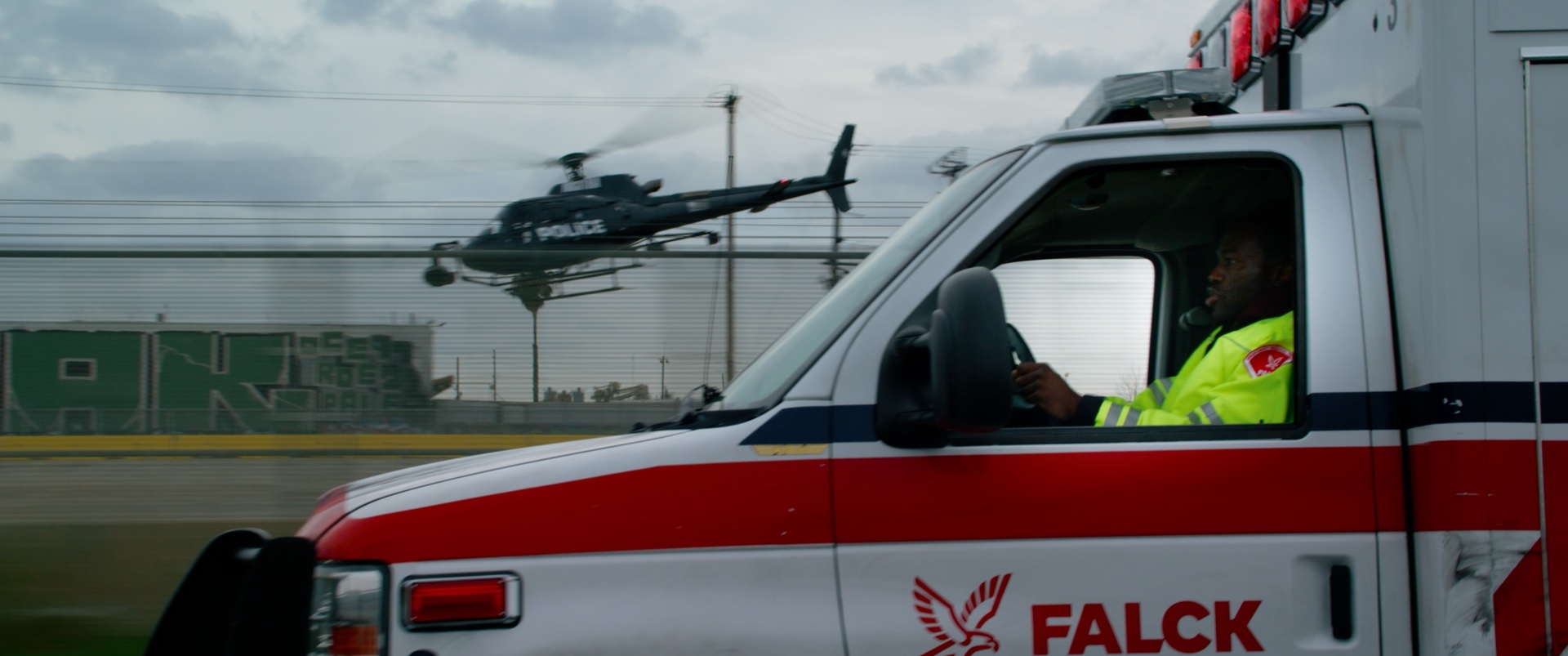Ambulance is in a stylish hurry to go nowhere in particular
Michael Bay leans on Jake Gyllenhaal and Yahya Abdul-Mahteen II while trying to suture drone footage into something meaningful

Michael Bay’s undeniable technical proficiency—and to action-movie fans, his charmingly old-fashioned storytelling sensibilities—can be extremely seductive, at least when it comes to luring moviegoers into theaters. More often than not, however, those elements produce some combination of a sugar hangover and full-on buyer’s remorse among viewers. The director’s onslaught of style, the organized chaos of his editing, and his overconfidence can leave audiences punch drunk. To wit, The Ambulance, which feels like the first movie written by an algorithm and directed by a drone.
Bay’s latest was reportedly conceived as a comparatively low-budget COVID-era time passer, a film that would restlessly cobble together core elements of Heat and Speed against the backdrop of greater Los Angeles. But like just about everything else in Bay’s filmography, The Ambulance almost immediately exceeds its intended scale, turning what should be a lean and mean retrograde high-concept hostage situation into a sprawling, geographically incomprehensible tour of one of the most gridlocked cities in the United States.
Jake Gyllenhaal, Yahya Abdul-Mahteen II and Eiza Gonzalez follow in the estimable tradition of Nicolas Cage, John Turturro, Frances McDormand and other “serious” actors wrestling with the twin impulses of trying to do real work while collecting a blockbuster-sized paycheck under the director’s watch. But Bay orchestrates the ensuing mayhem as if action cinema—and the realities of crime and crime-fighting—ceased to evolve after 1989 or ’90.
Abdul-Mahteen II (The Matrix Resurrections) plays Will Sharp, a God-fearing veteran desperate to raise money for life-saving surgery that insurance will not cover for his wife Amy (Moses Ingram). He reaches out to his adoptive, ne’er-do-well brother Danny (Gyllenhaal) for a loan and immediately gets recruited for a bank robbery with the promise of a multimillion-dollar payday at the end. But when a lovestruck police officer (Jackson White) insinuates himself into the building to pursue a bank teller, Danny’s best laid plans descend into chaos, with an LAPD Special Investigations team swarming the site and Will accidentally shooting one of the cops.
When EMT Cam Thompson (Gonzalez) arrives to provide medical service to potential robbery victims, Will and Danny hijack her ambulance and messily sneak away as what seems like the entire police force pursues them across the city. When they realize the convalescing patient in the back of their getaway vehicle is the officer that Will shot, the brothers frantically improvise an escape plan to keep the cash, get Will home safe to his family, and prevent the cop’s imminent death from turning a botched heist into a murder indictment.
Based on the 2005 Danish film of the same name, Prodigal Son and Chuck executive producer Chris Fedak’s script loosely aims to capture the heist and its aftermath in real time, a choice that best serves Will’s impulsiveness to get involved with Danny’s clearly harebrained scheme and, seemingly less intentionally, the cops’ repeated incompetence in containing and apprehending the runaway ambulance. For a filmmaker who, it seems fair to assume, unambiguously supports members of the military and law enforcement, Bay paints extremely unflattering pictures of both. Those images are ostensibly leavened only by pitting them against stereotypical Mexican criminals, whose ruthless violence makes dopey robbers and careless, overconfident police seem clever or thoughtful by comparison.
Like Will’s military past, Danny and almost all of the other characters on screen are defined by a one-sentence description meant to justify and explain the many complexities and contradictions of their behavior, from Danny’s uneven (biologically inherited) sanity to Cam’s cold-blooded medical skills under pressure. Behind the camera, Bay embraces his reputation as a “shooter” first, finding a through line in his reams of footage in the editing room. But his increasingly frantic assembly of the dozens (if not hundreds) of angles culled from drones and more traditional hero shots— all of which he seems to love equally—produces a relentless barrage of imagery that overpowers the viewer instead of pulling them forward. There’s just so much of everything at all times coming from every direction that none of it means anything—and you get the feeling that’s exactly the way that Bay wants it.
After roles like Lou Bloom in Nightcrawler, Gyllenhaal actually seems well-suited for a character like Danny Sharp, if Bay didn’t want these two brothers to have a real emotional bond and for neither to be a full-fledged villain. It’s hard to know if Gyllenhaal actually resisted the character’s sociopathic tendencies or his performance was merely edited that way, but the film gambles that viewers will like, care or even understand him by the end of the adventure, and it loses. Abdul-Mahteen II seems hopelessly overwhelmed by a nonstop string of plot developments, each of which make less sense than the previous one, while Gonzalez seems rightfully grateful to be playing a role in a Michael Bay movie where an EMT’s uniform doesn’t somehow involve a bikini.
That said, they anchor an ensemble that for better or worse collectively embraces the absurdity of this scenario with a sincerity it doesn’t deserve, which ends up undermining the opportunity for tongue-in-cheek fun. Then again, this is a world where cops knowing a robber’s name, face and criminal past means nothing if they can simply “get away” at the end of a chase that involves million of dollars, destroys dozens of cars, and creates a media circus.
Ambulance is boilerplate Michael Bay, a thrill ride full of muscle and testosterone and style. As has been the case more often in the past than people—especially his critics—like to remember, it’s once again maddeningly close to being Actually Good. But until the day Bay gets a real script, or decides to get out of his own way, the best audiences should expect is to hold on tightly and hope to survive the ride.